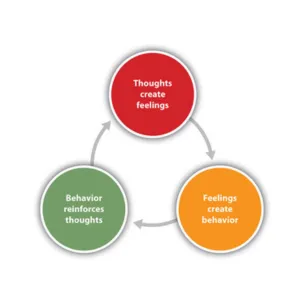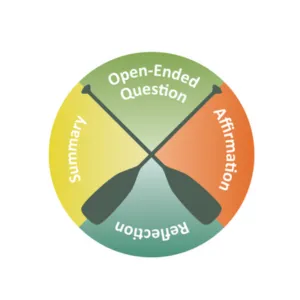Services
CBT:
Cognitive Behavioral Therapy

Cognitive Behavioral Therapy (CBT) is a widely recognized and effective psychotherapeutic approach. It centers on the premise that thoughts, feelings, and behaviors are interconnected. CBT therapists collaborate with individuals to identify and transform negative thought patterns that contribute to emotional distress and maladaptive behaviors.
This short-term therapy, typically spanning 12 to 20 sessions, equips clients with practical strategies to manage conditions such as anxiety, depression, and phobias. CBT's adaptability allows it to address a variety of concerns, making it a valuable tool in fostering positive change, enhancing mental well-being, and empowering individuals to regain control over their lives.
Trauma Resiliency Model therapy

Trauma Resiliency Model (TRM) Therapy is an innovative and evidence-based approach designed to help individuals recover from the effects of trauma. Developed by Elaine Miller-Karas and Laurie Leitch, TRM focuses on building resilience and restoring a sense of safety and well-being. It recognizes that trauma can disrupt the body's natural regulation systems, leading to symptoms like anxiety, hypervigilance, and emotional dysregulation.
TRM employs various techniques, including mindfulness and somatic (body-centered) awareness, to assist individuals in reconnecting with their bodily sensations and building self-regulation skills. By addressing the physiological aspects of trauma, TRM empowers individuals to manage their emotions and navigate life's challenges more effectively, ultimately promoting healing and resilience.
Motivational Interviewing

Motivational Interviewing (MI) is a client-centered counseling approach designed to elicit and strengthen a person's intrinsic motivation to make positive changes in their behavior. Developed by William R. Miller and Stephen Rollnick, MI is widely used in fields like addiction treatment, healthcare, and counseling. It operates on the belief that individuals are more likely to embrace change when they feel empowered and in control of their decisions.
MI practitioners employ open-ended questions, reflective listening, and empathy to explore a person's ambivalence about change. By fostering a non-confrontational, collaborative atmosphere, MI helps individuals resolve their inner conflicts, clarify their goals, and ultimately find the motivation to take positive steps towards healthier behaviors.
KAP - Ketamine Assisted Psychotherapy

Ketamine Assisted Psychotherapy (KAP) is an emerging and promising treatment approach for various mental health conditions, including depression, anxiety, and post-traumatic stress disorder (PTSD). It involves the controlled administration of the anesthetic drug ketamine, typically via intramuscular (IM) or intravenous infusion (IV), under the supervision of trained medical professionals.
KAP is distinct because it induces a unique psychoactive state that can promote introspection, emotional processing, and insight. This altered state of consciousness allows therapists to work with clients more effectively to address deep-seated emotional issues and traumas. Ketamine's rapid onset of action often leads to quicker relief from symptoms compared to traditional treatments. While still an evolving field, Ketamine Assisted Therapy holds promise in providing relief to those who have not responded well to other forms of therapy or medication.
EMDR- Eye Movement Desensitization and Reprocessing

Eye Movement Desensitization and Reprocessing (EMDR) is a specialized and evidence-based psychotherapy approach primarily used to treat individuals suffering from post-traumatic stress disorder (PTSD) and other trauma-related conditions. Developed by Francine Shapiro, EMDR involves a structured eight-phase process where clients revisit distressing memories while focusing on external stimuli, typically guided by their therapist's finger movements or other bilateral stimulation.
This therapy aims to reprocess traumatic memories, allowing individuals to desensitize their emotional reactions and integrate these experiences more adaptively. EMDR is believed to facilitate the brain's natural ability to heal by making traumatic memories less distressing, thereby helping clients alleviate the symptoms of trauma, such as flashbacks, nightmares, and anxiety. Its effectiveness has led to its use in various therapeutic contexts beyond PTSD.
About
Services
Contact
Terms and Conditions
(c) Connections of Hope and Healing, LLC 2023
Licensed in Idaho and Utah
